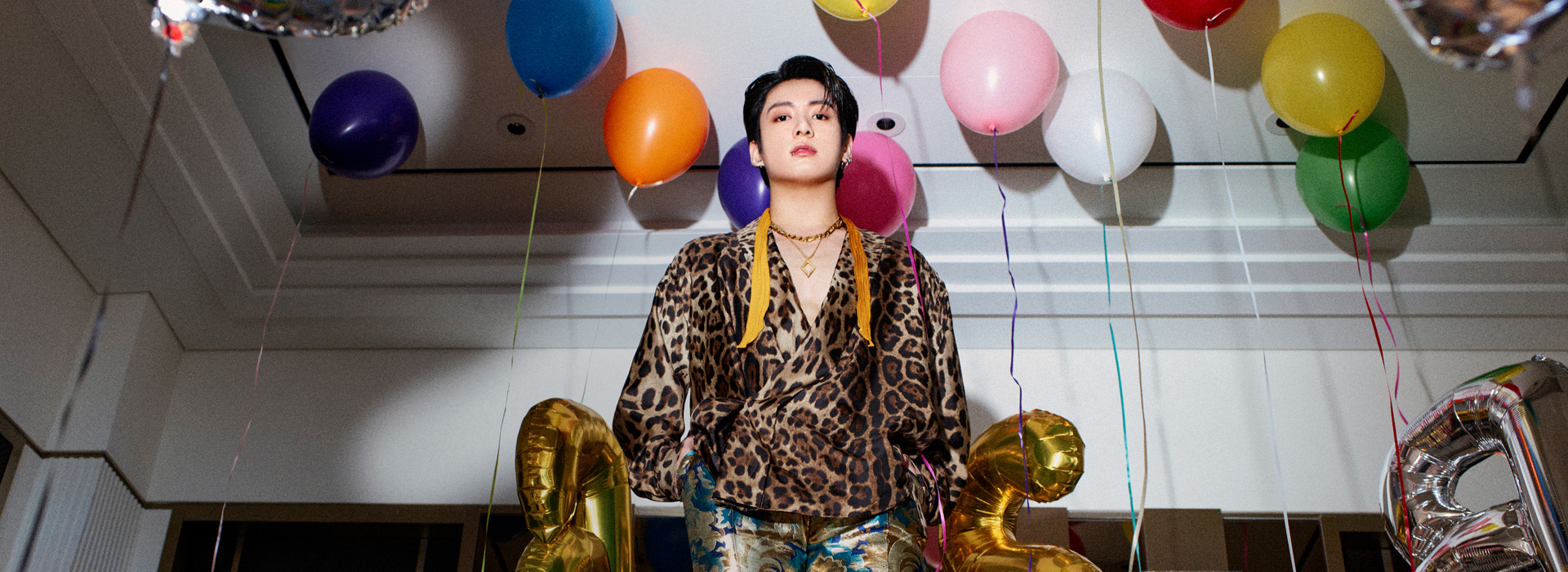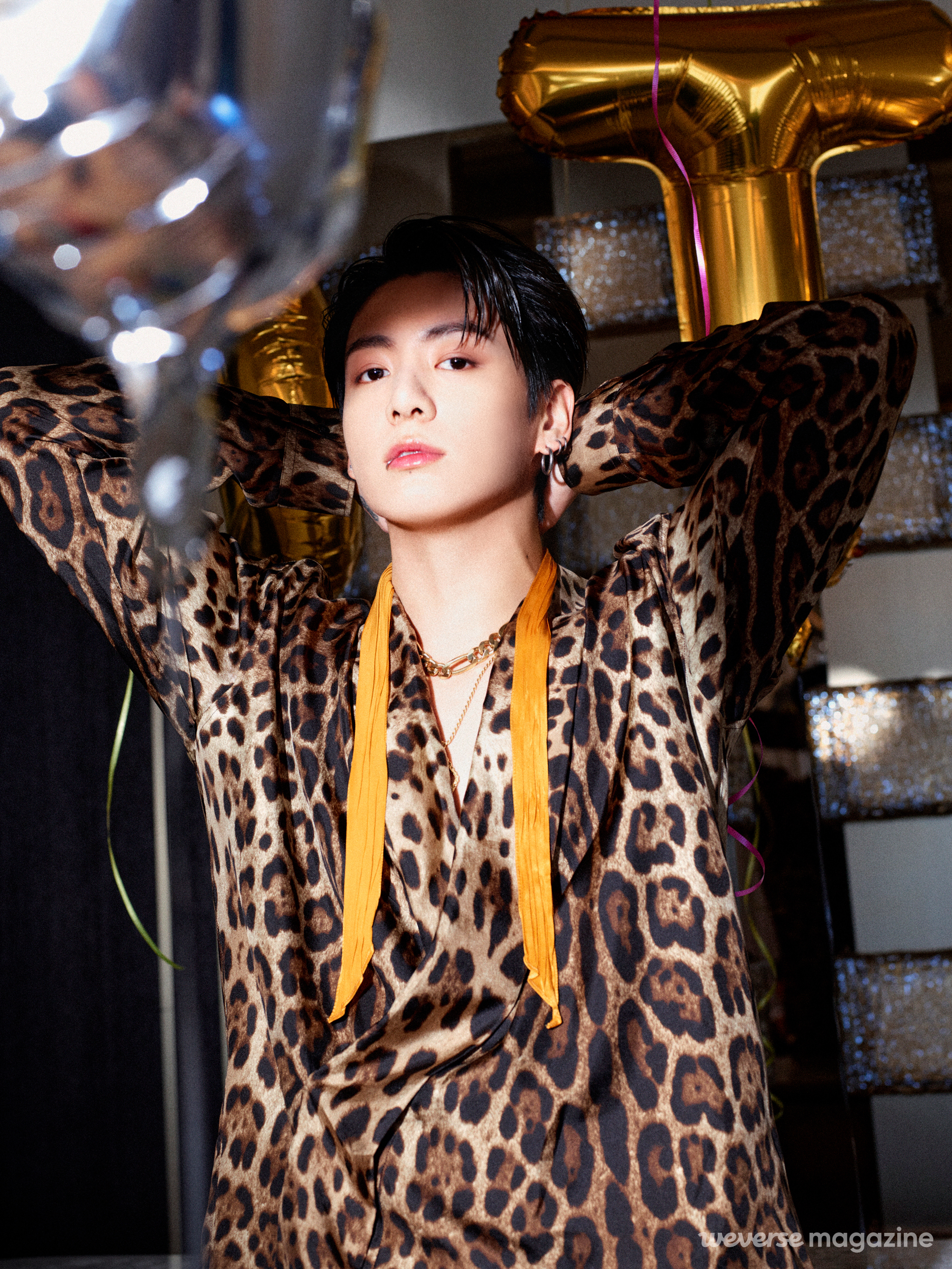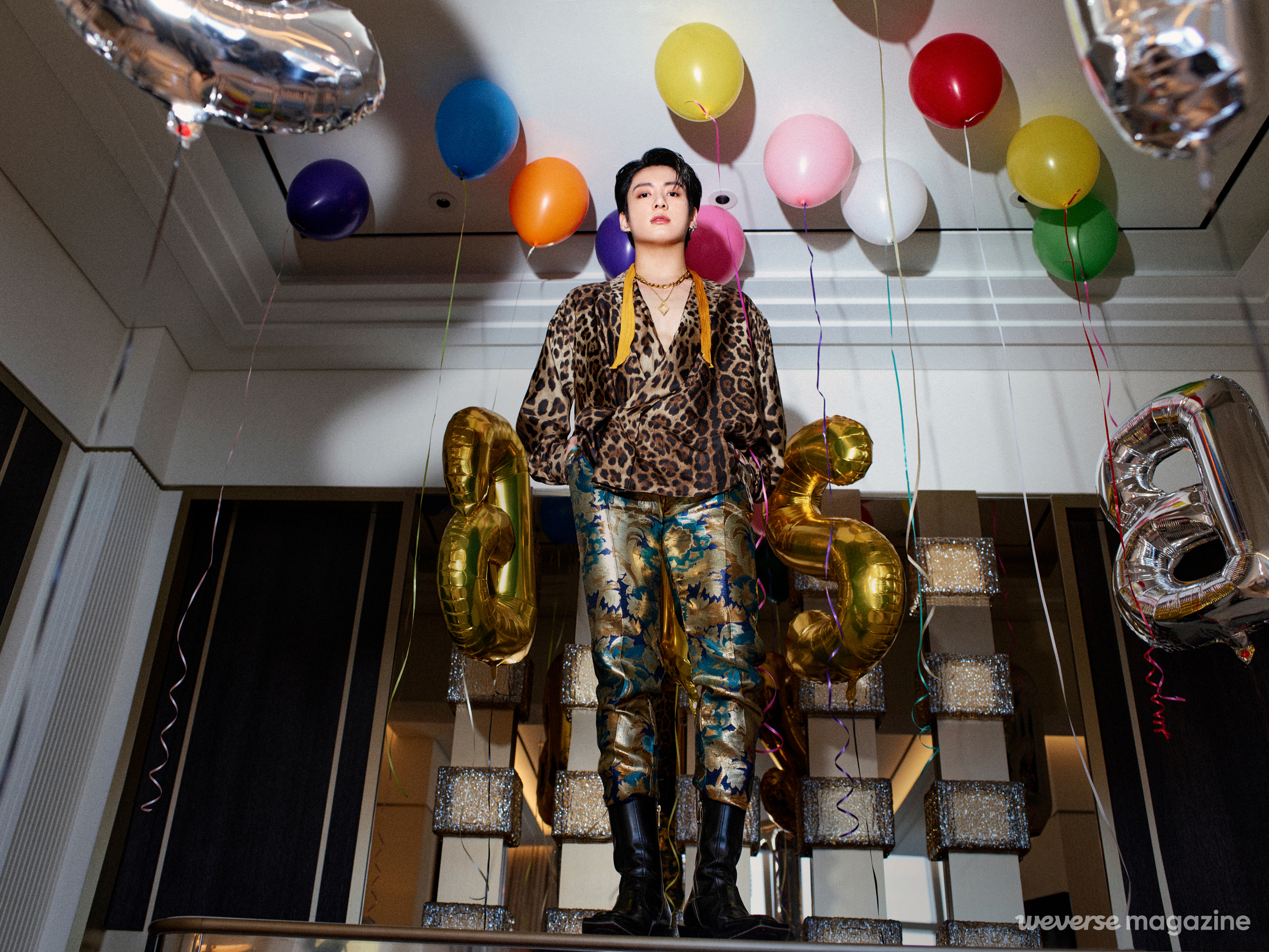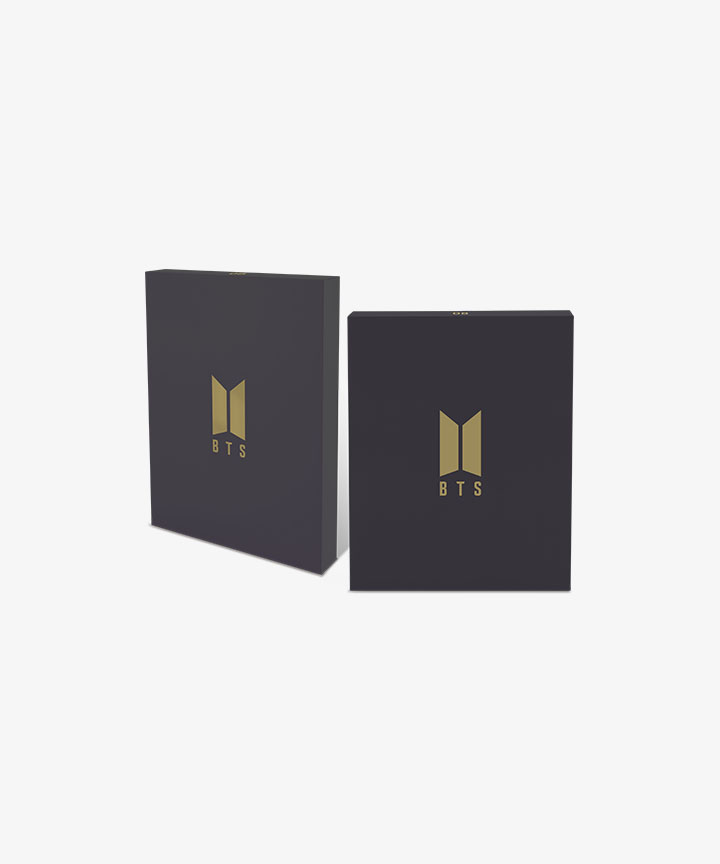
INTERVIEW
Jung Kook: “I want to prove myself through my music”
BTS ‘Proof’ release interview
2022.06.15
Jung Kook grew up as a part of BTS. That’s the Proof of BTS.
-
 Shirt, pants, boots and necklace by Dolce & Gabbana, additional necklace by VOKCHOI.
Shirt, pants, boots and necklace by Dolce & Gabbana, additional necklace by VOKCHOI.
For Proof, you did the introductions to “Yet To Come,” “Run BTS” and “For Youth.” Did you have to do anything special when recording each song?
Jung Kook: I mostly just listen for the mood of a song and then sing it—there’s no exact way to define what I do. But to put it simply, I’d say I sang “For Youth” in a very sorrowful way, “Run BTS” in a way that sounds like we did a long time ago and “Yet To Come” with a similar feeling to “Life Goes On.” I kept thinking I wanted to try recording again. I think I could do better, just that things were a little hectic when we recorded.
You spend a lot of time on V LIVE talking about your approach to singing. Were your thoughts on vocals reflected in the way you recorded yours?
Jung Kook: It turns out I discovered something new after I finished recording them: When you’re recording, the feeling is more important than your vocal technique. I consider what makes my voice sound good when it’s heard live versus when it’s recorded, so the live version and the studio version are a little different, too.
Your voice seems a little denser than it did when you sang in English for “Dynamite,” “Butter” and “Permission to Dance.” You make “Yet To Come” sound passionate right from the beginning, for example. Why the change?
Jung Kook: I used to make recording the studio versions my focus, but lately I’m trying to make my voice sound better without embellishing it too much, even just using my speaking voice. So I’m reflecting that in my voice. I think I was trying to embellish less and convey more sincerity.
The covers of “Chilly, Windy Night in 1991” and “Hate Everything” you posted to Instagram felt like something entirely new. Your vocals sounded like your speaking voice, so I thought maybe you became more interested in that style of voice.
Jung Kook: I kind of feel like I want my singing—my voice—to sound better. When it comes to vocal technique, I always used to embellish my voice, so I thought it would be nice if I could sing well even when it’s with a more natural voice. I want people to consider my voice good even when I’m singing in a way that emulates casual speech, so these days I’m mainly practicing singing in my speaking voice. I mean, I’m practicing using my voice just as it is.
Do you like to sing in your natural voice?
Jung Kook: To be honest, there’s a lot of times when I don’t like it. Even I think I sounded a little over the top or tried to make my voice sound extremely polished in my old performances when I hear them, but after trying to only sing with my natural voice for some time, I’m starting to feel sort of turned off by it. I know I can make a prettier sound, too, but I’m just trying to sing that way.
You sang “Stay Alive” closer to your natural voice, with some parts undeniably sounding like SUGA’s, and you also challenged yourself on some parts to sing in a higher pitch.
Jung Kook: Yoongi didn’t ask me to do it that way or anything. We were really happy the recording came out as well as it did (laughs) but it was difficult, to be honest. Recording it was really tough. It was hard because it wasn’t perfect, and because I still couldn’t do it despite trying it so many times. I more or less blamed myself. The song was a good choice, and the recording went well, but things didn’t go that smoothly.
You were singing even when you came in for the interview. I’ve seen you singing many times before, in fact. What does singing mean to you?
Jung Kook: Um … As far as singing goes, I want my name to become a shorthand for it. A shorthand for singing. I want to receive a lot of recognition and hopefully be able to hear my own singing and think, Wow, I’m really, really good. In other words, I want to be able to sing really well and feel comfortable doing so. I can’t feel that way every time I sing, but … I just want to be good. Now that I’m a singer and have appeared on so many different stages, there’s times I do such a good job up there that it gives me goosebumps, and with those experiences piling up, I keep thinking, How freeing and fun would it be to get up on stage and be able to sing the perfect song? Completely worry free, just like in my imagination.
How did you feel about the recent concerts, in that sense?
Jung Kook: I did the first two shows in Las Vegas and practiced my vocals some more the next day and thought, Why don’t I try to sing like this? then did the third and fourth shows. I was definitely feeling good for the second and fourth shows. And I had a lot of stamina and my throat was okay up to and including the second show. I was starting to lose stamina by the fourth show but my throat was still okay. It was hard since I felt like I couldn’t warm up my voice after having COVID-19. So I was really worried for the second show, but I felt like I was getting over the hump, which made me excited, and it was really fun. Before the fourth show, I did some vocal training that gave me some ideas of how to approach things. And, you know, knowing what to focus on makes a big difference. Even though it was somewhat physically demanding, the performance gave me confidence when I realized, when I did a certain song in the lineup, I felt a little more at ease knowing what would happen for sure, even though it was tiring, and told myself it would be best to practice a certain way from then on. It was really fun in the end.
Maybe that was your way of finding your footing for performing.
Jung Kook: It was awkward performing during the first show, but I also fell right back into the groove as the performance went on. I figured out after the concert that I just really enjoy putting on a show. I loved finally being able to perform again and I want to just keep on doing it.
With all the preparation that goes into performing and all your other work, do you find it having an effect on your everyday life? You said on V LIVE that you put your tongue to the roof of your mouth when you have your picture taken because it makes you look sharper but that you want to shake the habit for when you sing.
Jung Kook: I haven’t been able to break the habit yet. It’s hard. (laughs) But nothing’s ever really hard. I actually like paying attention to things like that. It makes me feel like I’m trying to change, at least in the moment.
How do you feel when you think to yourself, This is good enough, or, I’ve gotten better?
Jung Kook: Enough is never enough, but I feel good during English lessons when the teacher asks me vocabulary words I have memorized and I can answer right away. It’s like, I really memorized it! For singing, there’s the occasional time that everything’s going good. And there’s times it’s easy, which is when I think, This is because of all that practicing I did, right? I wish it were like that every day. (laughs)
Most of the time you spoke to the audience at the Las Vegas concert, you were speaking in English. That’s a result of working hard, too.
Jung Kook: I’m grateful when other people see that and tell me I really improved or I’m good, but I never think I’m good when I think about it myself. I think what I said in English sounded better to people than what they expected. Because I didn’t make any mistakes. But I really don’t think it’s anything to be proud of. If I were able to lead the whole concert in English like that without a teleprompter I’d say I improved a whole lot, but I’m not quite there yet. I still have a long way to go when I think about it, and I actually always want to be able to say everything I said easily and without any difficulty as soon as possible. When I say I did well, it’s just what I felt in the moment. But after that? I have to be better. Quickly. Quick, quick, quick. (laughs)
Does that apply to other areas of your life, too? You’ve been trying to build up your stamina recently by boxing.
Jung Kook: It’s more like the opposite. I have all these plans, but I have mismatched personality traits. I’m lazy, and inactive, and can’t be bothered with most things. So I try not to forget I made myself a promise to live a pretty active life, even if I have to force myself. I’ve been feeling that way a lot lately, so I’m going to grab hold of that feeling and not miss this opportunity and keep moving. Yesterday, for example, I could have just chilled at home at the end of the day, but I worked out one more time instead. I think you have to force yourself to do the things you feel are a hassle one by one. That’s how I’m trying to live my life.
Isn’t that less laziness and more pouring yourself into your work? (laughs)
Jung Kook: I wish that weren’t the way I usually am. (laughs) It’s not like I only do things when I find them fun—I have fun and enjoy learning things when I finally get around to doing them—but I feel irritated whenever I have to do something and don’t want to do it right up until I start. (laughs) I think that’s why I’m only doing things that help me be a better singer for now. If I tried to learn an instrument right now, I don’t think I’d feel confident in it right away, but I would still try to learn the drums if I felt like it. And dancing helps me for when I’m on stage. You listen to music when you dance, which is helpful too, I think. And boxing is helpful for becoming stronger, plus it’s fun. I chose it because it’s the most fun aerobic exercise. Reading books and practicing are all because I have to write lyrics. The same goes for English: I don’t know what will happen in the future, but if I have to speak in English or do an interview, I could use it then, and I can use it to write lyrics, too. I feel like those all branch out from being a singer.
You’re already doing so much as a member of BTS. What’s driving you to try all these new things?
Jung Kook: Because, in the end, I want it. I want to see myself being able to do all those things. I think there’s a lot of contradictions in my character. And maybe it’s somewhat about pride? There are times when I see someone doing something and think, If they can do it, why not me? And if I see someone really cool doing something, sometimes that’s the motivation I need to get started.
I think the type of people you surround yourself with is very important, whether you’re working together or just talking.
Jung Kook: I agree. I agree. I don’t think there’s much I can motivate myself to do without other people’s help.
The other members must be a big influence on you.
Jung Kook: A really big influence. Just seeing the others put out their mixtapes makes me think, When should I make one? There must be something I have that I can prove.
That’s where your Proof would come from—more so than winning any Grammy.
Jung Kook: I think our status is there whether we win a Grammy or not. That was just, I don’t know—a good experience? It made me realize that, while I knew that winning the Grammy Award is a huge deal, I wasn’t really interested in actually winning one. I’m more interested in proving myself through my music. And it was great seeing performances from people I never saw live before.
That reminds me of when you, j-hope and Jimin danced to the “Butter” remix together as 3J. The behind-the-scenes video revealed that you filmed the performance video several times. And isn’t that the most important thing?
Jung Kook: When Hoseok asked us to do 3J, I thought it wouldn’t be easy, but I just wanted to something. The things we do when we want to do them usually always turn out cool. It made me feel a little like being a trainee again while we did it. It was really fun because it felt quite different from working on an album. So we shot the video but every time there was always one or two spots where we were out of step. We kept filming it, even as we thought it wasn’t working as it was, but even after we finished we couldn’t shake the feeling it wasn’t quite right, so we practiced again at the end of the day and shot it again.
Why did you keep shooting?
Jung Kook: I thought we would be disappointed otherwise. It was fun, for sure, but on the other hand, it made me think, Is this all I’ve got? I understood the moves in my head, but it looked a bit jarring in the mirror. And then I thought I better practice alone if I was going to prevent it from happening again. I became acutely aware that I had to keep dancing if I was going to get used to it and improve.
Isn’t it difficult releasing something when you had to work at it until you were personally satisfied? Like how someone might hesitate to release a song they’ve written?
Jung Kook: That’s why there’s so many songs I’ve written that I haven’t been able to release. After making the effort to write them, I should have realized I should just edit them as much as I can and release them, but when I heard them again after a while, they didn’t sound good, so I just deleted them all.
Ah … What a shame.
Jung Kook: I’ve been that way for a very long time. The other members tell me, “You have to keep making releases. That’s how you figure it all out.” So I’m writing songs lately.
I listened to “Still With You (Acapella)” and your vocals are different from when you sing with BTS—they’re very calm and focused on details. If you had been releasing songs like that, it could have become something like your signature style.
Jung Kook: I think slowing down the pace at which I release songs like that really helps. I admit that I came up short a lot around that time. Even more than now. My thinking was that I could get off to a better start with my releases that way, so I think I made the right choice doing it my way.
You contributed to the music for “Run BTS.” Which part did you work on?
Jung Kook: It’s mixed in all over. Hoseok, Namjoon and I were having trouble with the melody in the first verse, so we split up and wrote separately, and then I said I would try writing something, too, which ended up working out, so I ended up taking care of the first verse overall. I wrote a new melody and connected each of our parts into one.
I guess you could say that’s part of the production process. Maybe you’ll do something similar with future material, too.
Jung Kook: I want it to be really unique. I want to write lyrics that don’t have any meaning, like a song where the word “yeah” is repeated for a whole verse—something like that—but it’s hard. I also wonder if I should try working with other songwriters, but I’m going to try doing it by myself first.
I suppose you’ll slowly improve if you do it that way. Where have you made improvements in particular since your debut? The new songs on Proof are about looking back on the past, after all.
Jung Kook: I think I changed after the pandemic hit more than any other time. I think I’ve had the most changes from then until now.
In what way did you change?
Jung Kook: I’m a little calmer now. I think I can see a little more clearly and for certain what I need to do musically now that I settled down. I still wouldn’t say I’ve turned into a grown-up entirely yet, but that feeling has slowly begun to reach me. I didn’t realize it until then.
Have you changed at all from being with the people around you or from seeing the world?
Jung Kook: I’m not sure. I think my whole personality has changed a lot. In the past I would get emotional or lose my temper. Sometimes I let my emotions get the best of me, but ever since the pandemic I’ve become more laid-back and I’ve been able to look at things rationally and realistically. And I don’t get mad as easily. Even my perspective on life used to fluctuate wildly, but now I think I’m more centered.
What do you think when you look at the other members from your new, more centered viewpoint?
Jung Kook: What we have now is different from the passion and spirit we had when we were younger, but we’re all ambitious and thoughtful and I’m thankful that they continue to be musically ambitious and keep expressing that. I think I would have grown up to be a very different person if the other members didn’t demonstrate their love of music the way they do now and I grew up observing that instead. I’m really grateful they still focus on our work.
There’s that motivation again.
Jung Kook: Yep, yep. (laughs)
Credit
Article. Myungseok Kang
Interview. Myungseok Kang
Visual Director. Yurim Jeon
Project Management. Minji Oh
Visual Creative Team. Leehyun Kim(BIGHIT MUSIC)
Photography. Hyea W. Kang / Assist. Jisu Um, Yonguk Shin, Heehyun Oh, Chiho Yoon
Hair. Som Han / Assist. Hwa Yeon Kim, Seong Hyeon Hwang
Makeup. Dareum Kim / Assist. Yuri Seo, Sunmin Kim
Stylist. Youngjin Kim / Assist. Yesong Kim, Bongkyu Kim
Set Design. Darak(Seoyun Choi / Yehui Son, Ayeong Kim)
Artist Protocol Team. Shin Gyu Kim, Jin Gu Jang, Su Bin Kim, Jung Min Lee, Da Sol An, Jun Tae Park, Seung Byung Lee, Hyeon Ki Lee, Dae Seong Jeong, Ju Sang Lee
Copyright © Weverse Magazine. All rights reserved.
Unauthorized reproduction and distribution prohibited.
Unauthorized reproduction and distribution prohibited.
Read More


